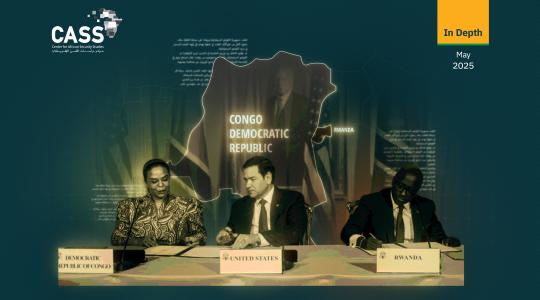Borno State in northeastern Nigeria has been a chronic flashpoint for security tensions for more than a decade, due to the activity of armed jihadist groups, particularly Boko Haram and the Islamic State in West Africa Province (ISWAP). Plagued by fragile security and weak infrastructure, the region has been the scene of dozens of bombings, ambushes, and assassinations. Maiduguri, the state capital, has been a prime target due to its political and administrative significance.
In the most recent attack in the state, a suicide bomber targeted a popular market and a humanitarian aid distribution center, killed at least 30 civilians and wounded dozens more. The bombing took place at a sensitive time of day, shortly before sunset prayers, indicating that the perpetrators sought to maximize the number of casualties. The operation was carried out with an improvised explosive device (IED) carried into a crowd of civilians, a tactic that suggests extremist groups are returning to suicide attacks after a period in which they were little used.
The operation, after a period of relative calm in Maiduguri, came as a shock to the public and to security officials, and has raised questions about the cohesion of the region’s security and intelligence agencies.
Possible Perpetrators
The initial evidence suggests that either Boko Haram or the Islamic State West Africa Province (ISWAP) were behind the attack, despite the absence of an official statement from either group. Boko Haram is known for its frequent use of suicide attacks, particularly involving underage girls or women, and has previously targeted markets, schools, and health centers in the state.
In contrast, ISWAP typically uses ambushes against military forces, and attacks targeting state symbols or strategic installations. The group is careful to avoid directly striking civilians, as it is seeking to gain a popular base. This suggests that it is less likely to have been behind the bombing.
However, the divergence of approaches between Boko Haram and ISWAP does not necessarily mean a lack of coordination. Some intelligence reports suggest a level of ad hoc cooperation or a division of roles between the two factions, especially since the killing of Boko Haram leader Abubakar Shekau in 2021. It is not unknown for extremist groups to resort to camouflage and operating on multiple fronts.
On the other hand, one cannot rule out the presence of local sleeper cells or the cooperation of local populations, under duress, of for ideological or even financial motives. Some analysts also suspect foreign intelligence involvement or infiltration aimed at destabilizing Nigeria for the sake of regional or international agendas.
Strategic Objectives and Implications
Beyond being a terrorist act, the bombing has far-reaching strategic implications. Its perpetrators appear to have sought to send the following messages:
• A political message to the Nigerian federal government, demonstrating that armed groups are still capable of striking deep inside urban areas despite military campaigns. The intent here was to embarrass the authorities and damage their local and international reputation.
• A warning against the return of displaced persons. The bombing comes as the Nigerian government attempts to implement programs to return thousands of internally displaced persons (IDPs) to their hometowns in Borno State. The attack could undermine these plans and force the state to double down on its reliance on camps.
• Undermining overall security and economic stability. Despite the unstable security situation, Borno State had begun to see attempts at recovery in some economic sectors. The bombing was intended to destabilize these efforts and spread fear among the population.
• Confirming the ability of armed groups to bypass the security cordon imposed around Maiduguri, which constitutes a blow to the morale of the security forces and could spell further setbacks in counterterrorism efforts.
Expected Implications
• For the Domestic Security Situation: The attack will heighten security concerns and erode the local population’s confidence in the state’s ability to protect them. It may also lead to increased militarization of civilian life and tightened security measures, creating tensions between the population and the authorities.
• For Regional Cooperation: This attack will reactivate Nigeria’s security coordination with Chad, Niger, and Cameroon, particularly through the Multinational Joint Task Force (MNJTF). However, this cooperation remains fragile due to diverging political interests and limited funding.
• For the Humanitarian Situation: The attack is expected to cause a new wave of IDPs, as people flee the areas where the attack took place. Humanitarian aid distribution will also be negatively impacted by increased security concerns among international and local organizations.
Post-Attack Scenarios
The attack raises several possibilities about what could come next:
• Scenario One: An Escalation and Geographical Expansion of Attacks. If the state fails to impose an effective security cordon, the region may witness an escalation in the frequency and geographical scope of attacks, extending to neighboring states such as Yobe and Adamawa, or even deeper into Cameroon and Nigeria. The militants will resort to suicide bombings, targeting markets, schools, and government buildings, and deepening the region’s instability.
• Scenario Two: Temporary Deterrence Through Intensified Military Interventions. The government may step up its military operations with external support, particularly from the United Kingdom and the United States. Despite what this could achieve in the short term, these operations could lead to greater violations against civilians and entrench public hostility toward the state, especially if they are not accompanied by genuine efforts aimed at development and helping society.
• Scenario Three: A Balanced Political and Security Strategy. The most sustainable scenario lies in a comprehensive approach that incorporates security, community dialogue, and the improvement of basic services. With the support of the African Union and international partners, authorities could build mechanisms for community reconciliation and the reintegration of former combatants, leading to a gradual decline in armed conflict over the coming years.
Conclusion
The Borno bombing is a reminder that the terrorist threat in Nigeria has not disappeared, but is resurfacing in different forms and with new tactics. Military action alone is insufficient to combat this complex phenomenon. Rather, it must be part of a comprehensive, strategic vision that addresses the roots of extremism and rebuilds the social contract in Nigeria’s northeast. Without this, such bombings will remain a threat, even a recurring reality, costing the security and stability of millions of civilians.




